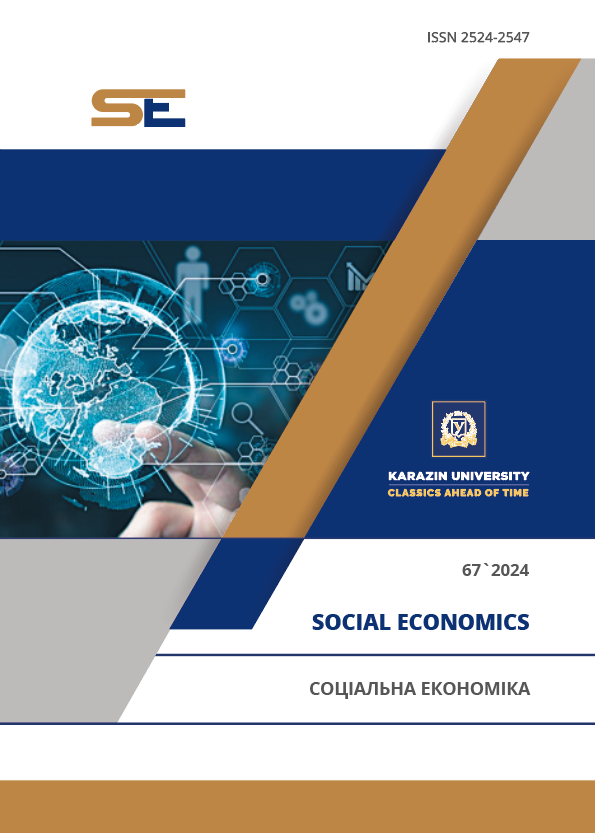NON-FINANCIAL REPORTING IN THE CONTEXT OF EUROPEAN INTEGRATION: TRANSFORMATION, CHALLENGES AND PROSPECTS
Abstract
The purpose of this article is to identify the key areas for further improvement of the organizational, methodological and regulatory support for the preparation and submission of non-financial reporting by Ukrainian enterprises in the context of European integration. To achieve this goal, the study provides for the solution of the following tasks: research and characterization of the methods of preparation of non-financial reporting; development of an algorithm for preparation, formation and disclosure of integrated reporting; identification of the main problems and challenges arising in the preparation of reporting in accordance with international standards and recommendations for their leveling. It is substantiated that users of accounting and reporting information today are interested not only in financial performance indicators of enterprises, but also in sustainable development as an integral part of business, which is measured mainly by non-financial indicators, which is ensured by the formation of integrated reporting. The paper proves that the introduction of integrated reporting in Ukraine is an essential proof of the country’s integration into the global and European society, since joining the European Union not only requires fulfillment of a number of certain criteria, but also obliges the candidate country to achieve and maintain a certain level of economic, social and environmental well-being. The author develops an algorithm for preparation, formation and disclosure of integrated reporting, at each stage of which the main functions and tasks to be solved by the management apparatus are indicated. The features of the formation of integrated reporting according to the international standards of the Global Reporting Initiative and the Sustainability Accounting Standards Board are disclosed. The characteristics of a sociological survey on the prevalence of the use of reporting standards among leading companies are presented. The mechanism of joint use of GRI and SASB standards in the formation of sustainability reports is substantiated, which will allow obtaining a comprehensive characterization of corporate activities, which will disclose information on the achievement of sustainable development goals and organized financial information. Prospects for further research in the subject matter of this article are related to the development of a mechanism for improving the quality and international comparability of non-financial reporting to assess the contribution of the corporate sector to the achievement of sustainable development goals.
Downloads
References
Torre, M., Blomkvist, M., Sabelfeld, L., & Dumay, J. (2020). Rebuilding trust: sustainability and non-financial reporting and the European Union regulation. Meditari Accountancy Research. doi: https://doi.org/10.1108/MEDAR-06-2020-0914
Monteiro, A., Cepêda, C., & Silva, A. (2022). EU Non-Financial Reporting Research. International Journal of Financial, Accounting, and Management, 4, 3, 335-348. doi: https://doi.org/10.35912/ijfam.v4i3.1179
Turzo, T., Marzi, G., Favino, C., & Terzani, S. (2022). Non-financial reporting research and practice: Lessons from the last decade. Journal of Cleaner Production. doi: https://doi.org/10.1016/j.jclepro.2022.131154
Aguado-Correa, F., Vega-Jiménez, J., López-Jiménez, J., Padilla-Garrido, N., & Rabadán-Martín, I. (2023). Evaluation of non-financial information and its contribution to advancing the sustainable development goals within the Spanish banking sector. European Research on Management and Business Economics, 29, 1. doi: https://doi.org/10.1016/j.iedeen.2022.100211
Yefimenko, T. I., Lovinska, L. G., Oliynyk, Y. V., Bondar, T. A., & Kucheryava, M. V. (2017). Introduction of non-financial reporting in the context of implementation of EU legislation in Ukraine. State Educational and Scientific Institution "Academy of Financial Management". (in Ukrainian)
Lokhanova, N. O. (2014). Corporate reporting in Ukraine and the world in the context of European integration ‒ investor requirements, problems, prospects. Economy and the state, 6–10. (in Ukrainian)
Kucheryava, M. V. (2022). Organizational and methodological aspects of non-financial reporting of enterprises in Ukraine under martial law. Finances of Ukraine, 5, 115-128. doi: https://doi.org/10.33763/finukr2022.05.115 (in Ukrainian)
Grechko, A. V., & Ocheretyana, O. V. (2021). Non-financial reporting as a tool for increasing the investment attractiveness of the enterprise. Economy and society, 25. doi: https://doi.org/10.32782/2524-0072/2021-25-38 (in Ukrainian)
Bezverkhy, K. V. (2014). Methodological principles of the formation of integrated enterprise reporting. Accounting and finance, 3(65), 8–14. (in Ukrainian)
Prodanchuk, E., Tripak, M., Hutsalenko, L., Myskiv, L., & Shevchuk, N. (2021). Organization aspects of the integrated reporting formation. Financial and credit activity: problems of theory and practice, 5(40), 110–119. Retrieved from https://fkd.net.ua/index.php/fkd/article/view/3555/3351
Kholyavka, V. Z., & Leshko, H. S. (2021). Analysis of non-financial reports of corporate social responsibility in the field of tourism. Scientific notes of the "KROK" University, 1(61), 163-168. doi: 10.31732/2663-2209-2021-61-163-168 (in Ukrainian)
Krutova, A. S., & Nesterenko, O. O. (2023). Accounting and analytical support for assessing the impact of war on the achievement of sustainable development goals. Bulletin of the Khmelnytskyi National University, 3, 7-16. doi: https://doi.org/10.31891/2307-5740-2023-318-3-1 (in Ukrainian)
Zadek, S., Hojensgard, N., & Raynard, P. (2000). The New Economy of Corporate Citizenship. Copenhagen.
Vester, F. (1997). Denken, Lernen, Vergessen. Munchen.
Hongtao, S., Honghui, L., Wenqi, H., & Huiying, W. (2023). ESG in China: A review of practice and research, and future research avenues. China Journal of Accounting Research. doi: https://doi.org/10.1016/j.cjar.2023.100325
Daugaard, D. (2020). Emerging new themes in environmental, social and governance investing: a systematic literature review. Accounting & Finance. doi: https://doi.org/10.1111/acfi.12479
Yang, C., Zhu, C., & Albitar, K. (2024). ESG ratings and green innovation: A U-shaped journeytowards sustainable development. Business Strategy and theEnvironment. doi: https://doi.org/10.1002/bse.3692
Gholami, A., Murray, P., & Sands, J. (2022). Environmental, Social, Governance & Financial Performance Disclosure for Large Firms: Is This Different for SME Firms? Sustainability. doi: https://doi.org/10.3390/su14106019
Eng, L., Fikru, M., & Vichitsarawong, T. Comparing the informativeness of sustainability disclosures versus ESG disclosure ratings. Sustainability accounting, management and policy journal, 13, 2, 494-518. doi: 10.1108/SAMPJ-03-2021-0095
Zubkova, A. B., Makarenko, A. B., Misyunya, R. M., & Maigurova, D. S. (2022). The choice between sustainable development and corporate social responsibility in international business. Scientific Bulletin of Odessa National Economic University, 292–293, 81-93. doi: https://doi.org/10.32680/2409-9260-2022-3-4-292-293-81-93 (in Ukrainian)




